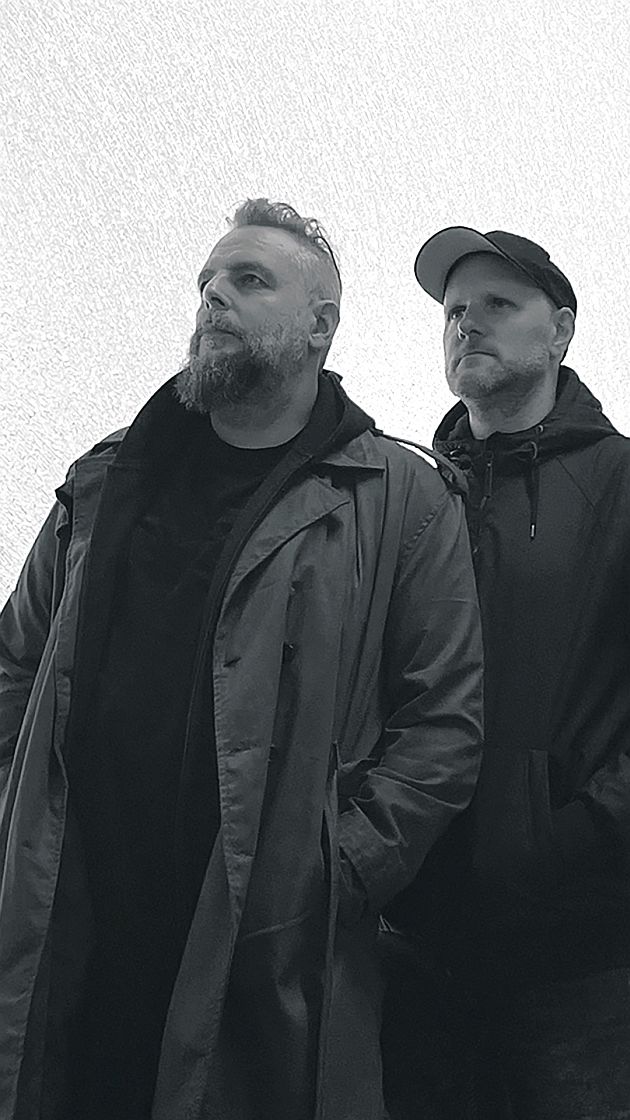 Interview with
Interview withSascha Mario Klein (music, lyrics, keyboards and production) from Neuroticfish
Influenced by the sound of SKINNY PUPPY, NINE INCH NAILS and DEPECHE MODE, the electronic music project of Sascha Mario Klein and Henning Verlage was founded back in the early 1990s. The duo’s last long player ‘Antidoron’ was released in 2018. Almost at the very same day five years later, a new album will finally come out on 15th December 2023. ‘The Demystification Of The Human Heart’ is a musical and lyrical journey through the corrosive state of society, the lack of empathy and the complex nature of the human condition. The release will be celebrated on 16th December with a “Heimspiel” (home match) in Kulttempel Oberhausen. We spoke with NEUROTICFISH master mind Sascha Mario Klein about the upcoming album, music in general and much more.
Reflections of Darkness [RoD]: The story of NEUROTICFISH began in the early nineties, back then as your solo project. The first album ‘No Instruments’ was released in 1999. Was music always a dream of yours, or what motivated you back then to start making music yourself?
Sascha: Well, in our house, when I was little, there was always music. My dad was a hobby musician back in the 60s. He used to go around with his band, playing music, as a guitarist and vocalist during his youth. And when I could walk a bit, I was allowed to sit next to him as a little kid when he had rehearsals in our basement. I used to sing along and all that stuff. So, for me, it was always clear. Music was always there. Making music was somehow ingrained in me. I got all that from my dad. And when I was a bit older, I got my first organ for Christmas, and I could even play along with the band. So, that’s when I started tinkering with music, pressing keys on the organ. Those were my first steps into music.
And then in my teens, I started playing in bands - like school bands, church bands, and stuff. But that never really clicked for me because I wasn’t too keen on just playing other people’s songs. My dad never did that either. He couldn’t read notes and basically invented his own way of reading music, with letters and lines,and then wrote his own songs. For my dad, it was totally normal to write his own songs and sing them. So, that was kind of passed down to me. Us kids even wrote songs together with my dad; about all sorts of nonsense.It was really cool, and that was pretty much normal for me. When I was 15, I got my first synthesizer as a gift from a cousin who didn’t want it anymore because it was broken. I started fixing it up myself, figuring out what could be done, and that’s how I got my first synthesizer. It’s still hanging on the wall here in my studio. It doesn’t work anymore; I need to fix it up again. But it’s kind of like a decoration piece on my studio wall. Then I started making stuff similar to DEPECHE MODE and even got myself a drum computer too.
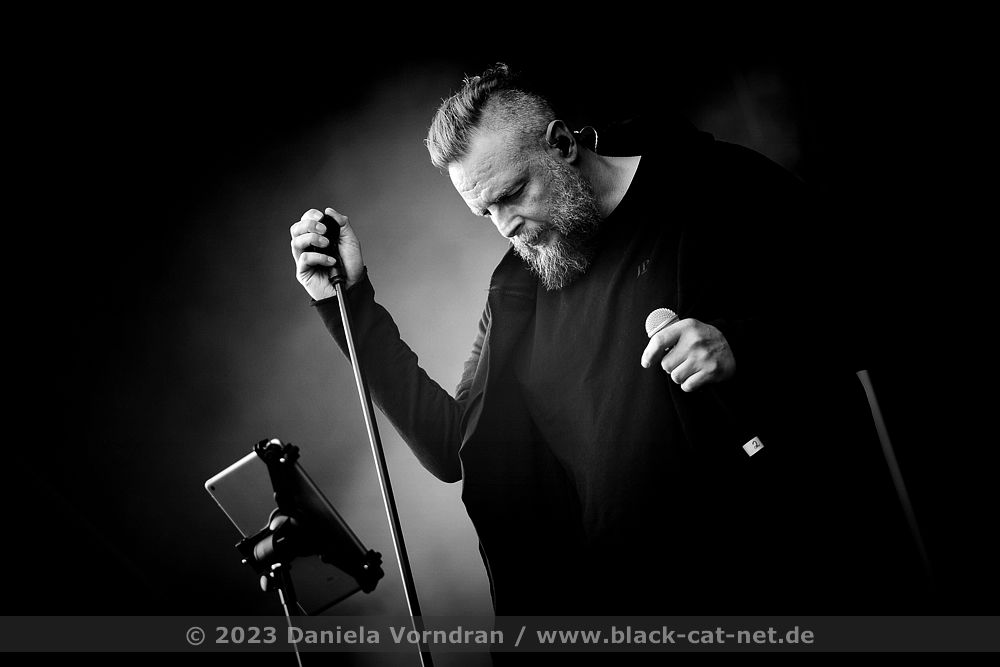
During my apprenticeship, every single penny went into musical instruments. And somehow, it all evolved. I was in this Gothic band as the keyboardist and songwriter when I was around 20. But nothing really came out of it. We had a sampler contribution, and honestly, I thought it was pretty terrible. [Sascha laughs] Then that Wave band fell apart, and I didn’t have a singer anymore. I didn’t know what to do next. I had always been tinkering more towards EBM, leaning into Techno, just for myself.But that didn’t fit with the whole Goth band thing. Then my girlfriend at the time, now my wife, suggested, "Why don’t you just sing yourself?" And I thought, "I can’t just start singing now." But she said, "You sing all day, you’re always singing along to the radio, doing all sorts of things. Give it a shot." So, I started. And that’s how ‘No Instruments’ kind of came to life. And well, now, here I am.
RoD: Can you still remember your very first NEUROTICFISH gig?
Sascha: Yeah, I can remember it really well because I even have old photos of it.
RoD: Where was it? Do you remember when that was?
Sascha: That must have been around 2000. Yeah, I think it was 1999/2000. In Arnheim, that’s where it was. I can’t remember the club, though. But we were one of the smaller opening acts at a festival. DAS ICH was the main act, and I think FEINDFLUG played before us. I’m not entirely sure. Anyway, the band before us had spilled their drinks on the stage, and I slipped right into it. [Laughter] My first time on stage as NEUROTICFISH, and I already fell flat on my face. But that kind of broke the ice. At the keyboards back then was Sven Plaggemeier. He was the founder of the German DEPECHE MODE website. I met him through a user forum about web design and on the German DEPECHE MODE mailing list. We became friends, and he stood by me on stage, pressing the keys. That was the first concert in Arnheim and then there were more and more after that.
RoD: So, next year, you’re basically celebrating a 25-year stage anniversary. At least, the first album will definitely turn 25.
Sascha: Yeah, I’m thinking about whether I’ll do something for that. Like, whether I should re-release it or something like that.
RoD: That was actually my question, whether you have something special planned for the quarter-century mark, if you have something in mind for that.
Sascha: Nah, not really. I mean, not in the sense of throwing a big celebration or anything. We already have our "Heimspiel” in December, which is kind of our big party. I’m not sure if organizing something similar three or four months later would be worthwhile. I’m not sure if that would make sense. But in terms of releases, I’ll probably do something. Maybe I’ll put ‘No Instruments’ out on vinyl. We’ll see. I’m not really a huge vinyl fan, but for ‘No Instruments’ it could work. It might actually sound nice if pressed on vinyl.
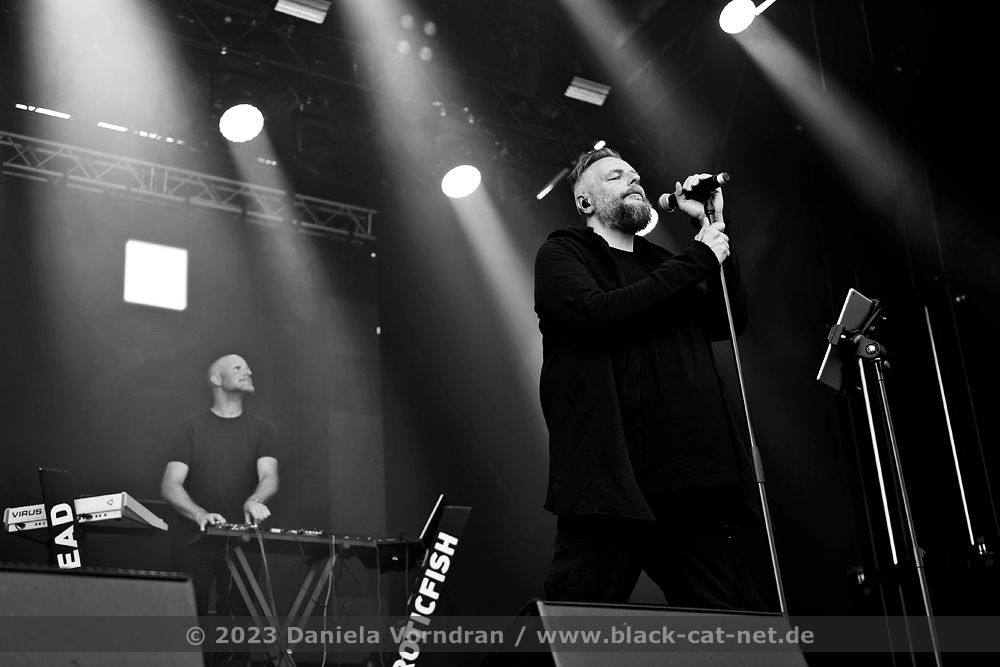
RoD: Well, I’m a huge vinyl fan myself. So, I’d find that really cool. Although, I still think it’s nice to have a digital download included. That way, you can display the album nicely on your shelf and spin it when you want. But at the same time, you’ve got it for listening whenever and wherever you want.
Sascha: The sound guy in me always comes out in situations like this. If I were to do that, would you release it on vinyl too? I made the album digitally on the computer, with a stereo width, dynamic range, and loudness that’s as perfect as I wanted it to be. You can’t press that onto vinyl like that. The needle would just jump around. Or you’d have to make four or five discs because the tracks on vinyl are so wide. That’s not financially feasible. You won’t get paid for that. So, to fit the music onto one or two discs, I’d have to make it less wide in stereo, quieter, reduce the dynamics, just so the needle doesn’t skip.
I tried that. I think I attempted it with ‘Antidoron’. It didn’t sound right to me. It didn’t sound how I wanted it to. That’s why we scrapped the idea. We said we’ll release it the way we want it to sound. If I have to compromise just to fit it onto, in my opinion, a lovely, tactile, wonderful but unfortunately outdated medium like vinyl, I’m not sure about that. I’ll probably get into loads of flame wars now because I’m not a huge vinyl person, but like I said, ‘No Instruments’ is simply made without that loudness and stereo width. Simply because back then, I didn’t know how to do that. Re-releasing it and perhaps adapting it for vinyl might be a nice thing. But I’m not sure yet. I’ll look into it next year. I need to talk to Henning about that; it’s an idea I have.
RoD: I’m curious to see. You actually prefer playing smaller club concerts or festival gigs. But going on a full tour isn’t really your thing, that’s what I remember. When did you realize or decide that it wasn’t good for you?
Sascha: That was during the ‘Pleasure and Pain’ Tour. I think it was in 2001. We did 10 gigs in a row, together with S.P.O.C.K and MELOTRON. We all sat in the tour bus and somehow travelled non-stop through Germany and Europe day and night. And when I got back after that, I was sick for two weeks, with a cold and all the trimmings. And then I thought, what’s the point of this? That’s when I realized that being in transit like that wasn’t for me. You’re always in third places, never really at home, never having a personal space to retreat to. You’re either in the tour bus or in the hotel, and then you’re back on stage doing soundchecks or already on the move again. And that doesn’t suit me.
I’m not a fan of being in transit. I like being somewhere, when I’m there. Then I’m really excited. But just being in transit isn’t my thing. Plus, Henning and me, we have very few overlapping dates where we can make it work. Henning has his main job, and I have mine. We have to synchronize our time for NEUROTICFISH so that we both have time for each other. We’d rather sit in the studio, working on our songs, mixing, and producing, than spend two or three weeks on tour. Not to mention that it would eat into my annual leave. My family has something to say about that too. That’s why it’s a bit difficult. I receive a lot of requests, like, why not do a tour in the USA or something? It’s all challenging for us. The way we’re doing it now actually makes us quite happy. Henning and I talked about it recently. The advantage with NEUROTICFISH is that we can do it the way we want. If it works, great. If it doesn’t, we need to change something. But the way we’re doing it now works for us, and that’s good.
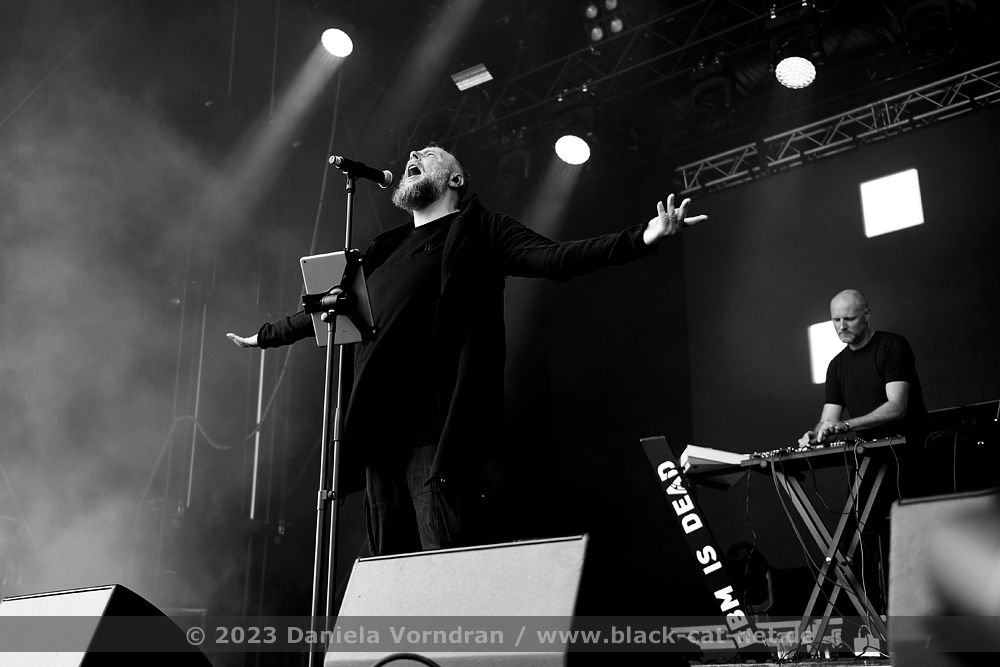
RoD: Speaking of Henning, he has been part of this since the early 2000s, initially as live support. And I think, it’s been since 2005 that you’ve been firmly together as a duo. How did you two meet back then, and when did you decide to pursue musical paths together?
Sascha: Uhm, Henning joined me around 2001, I believe it was for WGT. That might have been our first gig together. At that time, I was still signed with a record label and management, and we were looking for someone. Henning and his former band had also applied to this management, and that’s how we got in touch and realized, “oh yeah, this sounds pretty good”. He was studying music production in Enschede, and we started performing live together. Since he was studying music production, I was often with him in Enschede and in the studios where he worked, watching over his shoulder. Eventually, a very good friendship developed, and around 2003, we teamed up when it came to producing ‘Gelb’. We said, “let’s do this together”. And then I said, “You’re already on stage with me, in the studio, so you might as well be part of it”. And that’s how it came about. By now, I think he’s a professor at the University of Münster - for music production [Sacha laughs]. And I remember him back when he was a student.
RoD: You announced your breakup or farewell from the stage, I think it was at WGT in 2008. However, in 2013, you performed a show in Bochum (RoD reported about it here) and released a new EP later. What prompted the farewell from the stage, and what motivated you to record new music and perform again after a longer break?
Sascha: Basically, the main reason for NEUROTICFISH breaking up was me. I couldn’t handle all the chaos anymore. NEUROTICFISH was becoming more and more popular, and the more famous you get, the more people tug at your sleeve and want something from you. And the music business, let’s say, it’s a snake pit - not exactly a pleasant environment for a naive musician who just wants to create art. I didn’t quite grasp the business back then and was pretty burnt out. Eventually, I just didn’t feel like it anymore. It wasn’t about the music; it was more about the business side. I felt drained, burned out, and I said, “nope, if something I love doing, my favourite thing to do, if that’s making me feel this terrible, then I’d rather stop”. So, I stopped. Henning found it very unfortunate.
We would occasionally talk on the phone. Henning and I always kept in touch over the phone. In 2012, I felt like doing something again. And then Henning said, “I thought you’d never ask. Anyway, come to the studio”. So, we sat down together, discussed, played around with some song ideas for like two or three days, and checked things out. And then we were also clear that, if we were starting anew, it had to be in a way that wouldn’t lead to what happened during our breakup. So, we decided to do everything ourselves. Maximum control, maximum risk on our own, of course, but I don’t have to ask anyone when to release something. I can decide which sampler I appear on and which ones I don’t. I can choose which festivals to play at and which ones not to. And all those things. So, we said, “let’s try it ourselves”. That’s how I started the label [Non Ordinary Records] and began learning what it takes to run a label. Then, in 2015, ‘A Sign of Life’ was released, which was the first album we put out on our own label.
And in 2013, there was the reunion concert at the Matrix in Bochum. That was really funny. I had a website. It only said “A Sign of Life?”. And at some point, I had two messages on my answering machine when I got back from work. The first one was from Peddy Sadighi from NeuWerk. “Dude, we have to do something. Call me!” I thought, where did he get my phone number? And the second was from Mike Kanetzky from the Matrix. “Dude, we have to do something together. Call me!” That’s how the Matrix concert happened. I had no idea who was going to show up. Does anyone even remember us? And then the Matrix was packed. It was totally jam-packed, all the way to the back. It was an experience where I thought, “Wow! I wouldn’t have expected that.” And actually, you see it at every “Heimspiel”, how many people really come to see us. And that makes me so happy. It always touches me deeply when I see they’re not just there because it’s a festival, but they come specifically for us. Just for you. And I find that beautiful, it’s kind of humbling. I think that’s great.
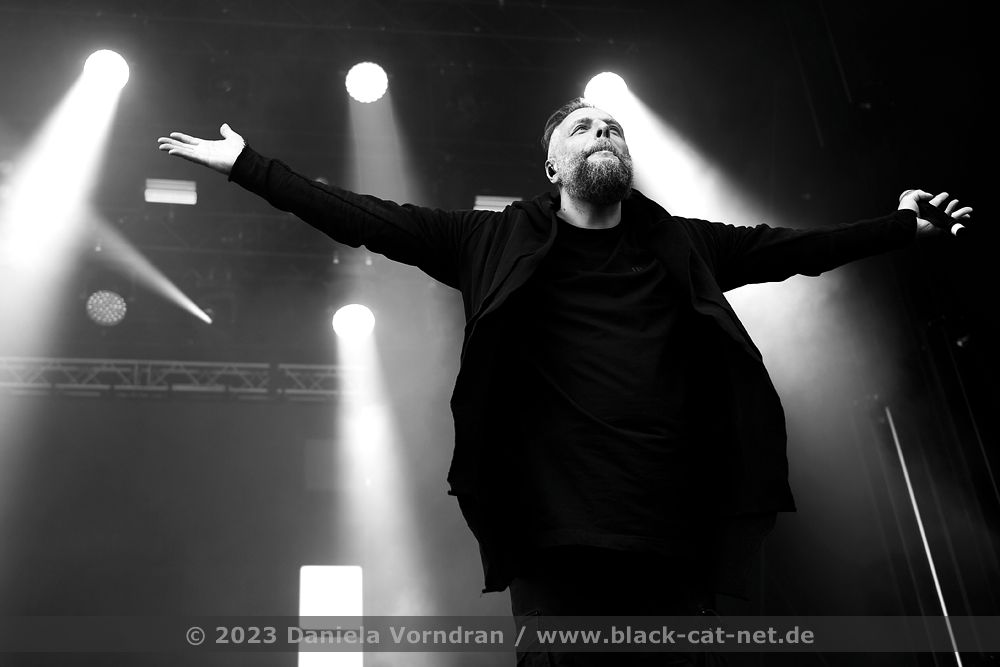
RoD: The last album is already five years old. Now, finally, a new one is on the horizon. Each of your albums revolves around a specific theme. With ‘Antidoron’ it was about mourning. In an interview, you mentioned that you processed your own grief through that. The new album is titled ‘The Demystification Of The Human Heart’. It explores the interactions of the human heart within a world in crisis, tackling themes like conflict and escalation. We have more than enough crises currently. I find it all simply unbearable and sometimes go for days without watching any news because it all just gets to me. Is it similar for you, and is music a way for you to grapple with and cope with such issues.
Sascha: Yeah, I definitely believe that. I think it’s a form of self-therapy. ‘Antidoron’ came out in 2018. My father passed away in 2016. I processed everything surrounding that through it. I’m sure of that. I didn’t do it consciously. I didn’t sit down and write a song about grief. I just sat down and worked. And eventually, a song comes out, a tune comes out, a beat comes out, phrases stick in my head. Something inspires, and it just clicks. And then a song is finished.
And with this album, it was like that. Let’s say, I struggle with the world too. I can’t watch the news right now either. And when I look at the comment sections of some things happening in our scene, it terrifies me, and sometimes it really gets to me. So, I deliberately distance myself from all these things. It’s self-protection, plain and simple. ‘The Demystification Of The Human Heart’ is actually about what one can do. Or let’s say, I struggle with the world, as I mentioned before, and the world isn’t getting better, and I’m trying to make sense of it somehow. There are a lot of internal dialogues in the album, presented lyrically. For example, in ‘We Are Not Safe’ the chorus goes like “We’ve got to listen and understand / this is what we represent”. So, we should start listening to each other again and try to come together. Because social media and everything that has emerged in the last 15/20 years with the internet haven’t necessarily contributed to bringing us closer together. Instead, it’s broken down a certain barrier, allowing us to say things to each other that we might not say in person. And that’s one aspect of it, for example.
The other aspects are that I’m trying to figure out for myself, how do we get back to a normal state? Or is this the new normal? How do we deal with this? And in doing so, I’m trying to question myself. Because I can’t always say, “the world sucks, the world sucks”. I’m also a part of the world. I’m a part of it, and what can I contribute to make it better? And I hope that my album also encourages a bit of reflection and thinking along these lines.
RoD: The album is your first one after the pandemic. Did this time of the pandemic, the lockdowns, have any influence on the new songs?
Sascha: Yeah. During the pandemic, there was often this idea that it’s great for musicians. They can just sit in the studio and write songs. I always shook my head at that because, for me, inspiration doesn’t really happen from within. You need to be inspired by something. And when nothing happens except watching TV and the news, and you have this fear, like if I catch this crap, I could die. That’s been what’s been going through the minds of many people for two years or more - mine included. And that has largely affected my creativity. It just wasn’t happening. Nothing came to me at that point.
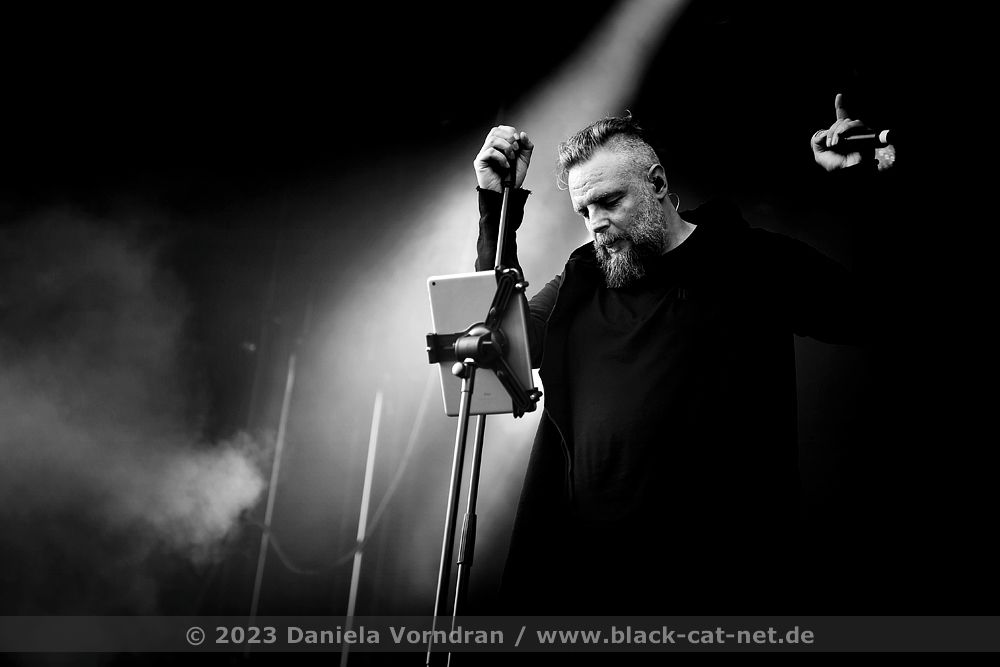
That kind of shook things up a bit for me in my work with MORPHOSE. When Christoph asked me to write songs with him, that was something that broke the pattern a bit. Because it was a different way of working. The song didn’t solely come from me; there was a sketch of a song from Christoph, and I listened to it, and then there was this back-and-forth, a sort of ping-pong game. And that was inspiring again. Because you’re back in interaction with people. Even if it’s just through email or over the phone. But that loosened things up a bit because at times I had doubted myself. Can you still do this? What’s going on now? Is the fire gone? Can you still write? And through MORPHOSE, I realized that of course, I can still write. I just have to find ways to inspire myself again. So, during the lockdown, in the pandemic, I worked out a few ways to motivate and inspire myself. And the result is out now on 15th December.
RoD: I think you once mentioned in an interview that you often use a certain “NEUROTICFISH toolbox”. However, on the new album, you’ve also worked with harder, Trance- and Techno-like sounds and beats (for instance, on ‘Rival’ or ‘Sleep’). ‘Bring The Noise’ has a rather Future-Fop sound and heavily incorporates voice distortions. Then there’s ‘How To Suffer’, a genuine Synth-Pop gem on the album. The beginning and end, with ‘Imposter Syndrome’ and ‘Gone’, are quite stripped down, placing emphasis on your vocals. Did you consciously play with different styles and influences, or did that come about more randomly?
Sascha: Actually, Henning and I discussed that, and I wanted to do something new with my voice. In ‘Antidoron’ the voice was relatively clear and prominent, pretty easily located in most songs. It was produced rather naturally, I’d say. But I wanted to move away from that. I wanted to extremize. I wanted to experiment with the voice the way people in the EBM and Industrial scene do, using distortions, working with vocoders. But I wanted to keep it melodious. When we talked about it, I explained to Henning: I want to dehumanize the voice. But at the same time, it should sound like a machine singing, yet with maximum emotion. So, the feeling should be in the expression of the voice, not in the production of the voice sound. That’s why we toned it down and layered many vocoders on top of each other. I think in ‘Rival’ we stacked eight vocoders just to achieve that dehumanized sound. But the voice sings, and the maximum expression should be in there, a heartfelt expression. So, those were two opposites we tried to work with. And I’m quite satisfied with it. I still listen to the album now and then, just to see if I’m still cool with it. And now that it’s finished, I’m totally cool with it. I also like the vocal production because it’s something different.
RoD: Also ‘Gone’ is a track I’d really like to hear in an acoustic version. When I listen to it, I imagine it with real strings, perhaps an orchestra. Is that something you can envision?
Sascha: No. Actually, years ago, around the time of ‘Gelb’, we orchestrated a song (‘Care’). It was a great experiment. But to be completely honest, I’m so electronically inclined as a musician that I can’t imagine translating it into an acoustic version or something like that. I mean, if the song is good, it works that way too. But I can’t envision performing it like that personally. Because those sounds you hear in the track are how they form in my head. I have an idea of the electronic sounds I want to use. A lot of it also comes from experimenting. So, turning that into an acoustic version isn’t how I perceive NEUROTICFISH for myself. You know, unplugged, which is often done, or orchestrated, as some artists (even from the scene) like to do. I don’t think that’s my cup of tea.
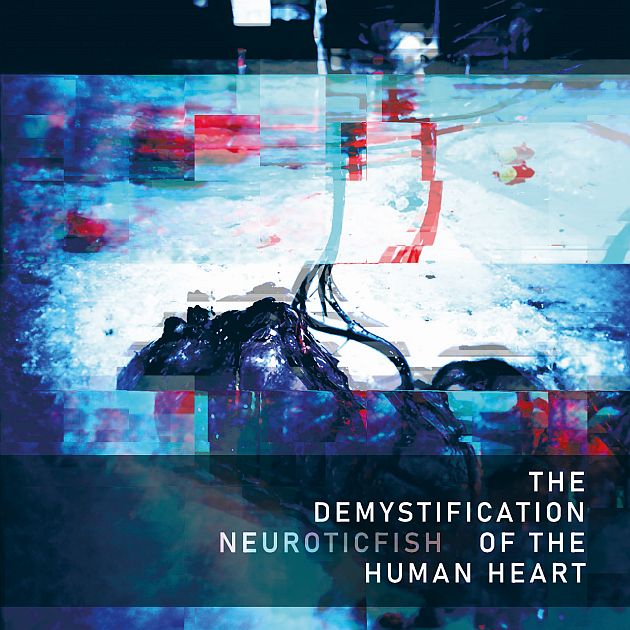
RoD: The album is, of course, being released digitally. But for fans who prefer something more “tangible” and favour the CD format, there’s something special. Tell me, what have you come up with?
Sascha: Yeah, we’re currently printing the CDs. Well, hardly anyone buys CDs these days. And the people who do buy the CD, they’re usually the hardcore fans who also want something from us they can put on their shelves, which I think is awesome. But the majority of people listens to our stuff on Spotify or Apple Music or something like that. So, I thought, what else can you give the folks? As a kind of thank you or appreciation. Then I thought, many bands do a limited edition or an unlimited edition and all that. And then I thought, how about creating something where we make the CD artwork an unlimited limited edition? So, each artwork, each front artwork of the CD, is a slightly different artwork - subtly different. The theme remains the same. The main motif is always the same. But since we use distortions in the songs and vocals, which always sound different, I said, I’ll digitally distort this artwork uniquely for each CD. I wrote software for this. That’s my main job, doing things like that. So, I wrote my own software for it, worked with the pressing plant for over four weeks to figure out how we could achieve this production-wise - how they could produce it.
RoD: I imagine it makes it relatively expensive when each copy gets a slightly different artwork.
Sascha: Actually, it is more expensive, but it’s within reason. It’s okay. I’m just waiting every day now for the delivery from the pressing plant. Hoping everything went well. Hoping that everything we planned worked out. We had to coordinate formats, all the printer-specific stuff because the artworks are done at the printing plant, with colour orders and everything. I had to negotiate all of that, had to learn it all beforehand because I didn’t know all of that. But I sorted it all out with our CD manufacturer. They were super helpful and really assisted us because they also find it awesome. Then, three weeks ago, I handed over this artwork, and I haven’t heard from them that they can’t use it. [Sascha laughs] So, I handed it to them and said, “this is your version”. And then they came back saying, “yeah, we’re starting to work on it now”. And now, I’m sitting on pins and needles, waiting, eager to see how it turned out for real. Because we’re the first band to do it this way. As far as I know, no one has done it before. I know THIRTY SECONDS TO MARS tried something similar with their vinyl edition (for their latest album) by having an AI reimagine the vinyl’s protective cover every time. But even that was only for a limited edition. But I think the front artwork was always the same.
We decided to go for it - making each front artwork different, so that everyone gets their unique copy. Even if our first batch sells out at some point, I’ll press more, and there’ll be a whole new set of unique covers, ensuring no two CDs are alike. The songs on the album remain the same. I won’t change that; only the artwork will differ. I’m as excited as a kid in a candy store. I don’t know how I’ll feel about it. I don’t want to jinx it. I’ll wait and probably open the package trembling, checking if it turned out the way I wanted. Yeah, it’s an experiment, and I think that’s pretty cool. That works only because we have our own label and can negotiate this independently. If I were with any other label, they’d probably say it’s too expensive to produce, and there wouldn’t be enough margin. So, as an artist, I can make these kinds of experiments and decisions on my own. That’s the idea. I hope it works. I’m excited.
RoD: I believe that. After all, you don’t yet know yourself how the discs actually look, how the covers turned out in the end. In any case, a very cool idea.
Sascha: No, I don’t know. I generated all the artworks. And then I saved them and sent them to the pressing plant. I know how they’re supposed to look. How it actually looks in the end, we don’t know. [Sascha laughs] That’s good, that’s really exciting.
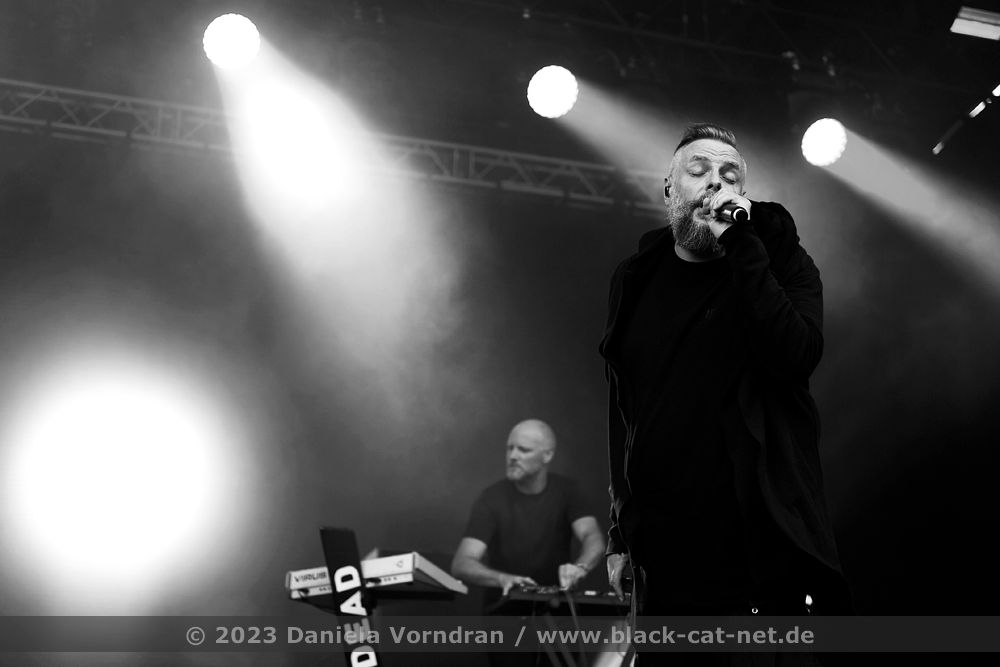
RoD: I’m curious. Let’s come back to songwriting again. Some artists write the lyrics first and then develop the melodies around them. For many, though, the melody, the music (at least partly) comes first, and then the lyrics follow at some point. How is it for you?
Sascha: Yeah, it really depends, you know? Sometimes, I get a text phrase stuck in my head. Like, for instance, with ‘How To Suffer’ I initially had [Sascha sings] “Every time I’m here with you”. And I was like, “huh? That’s major, not minor, Mr. Klein”. You’ve never written anything in major before. So, I started building everything around that phrase. But it sounded too cheerful and all over the place. So, I worked on it for weeks, trying to infuse a certain sense of tragedy into it - the song ‘How to Suffer’. Alongside that, the lyrics started coming together. The art of it, how should I put it... it’s a cheerful major-key song but with a really tragic chord progression underneath. It was a super cool experiment, trying to make it carry that weight and a bit of melancholy despite being in a happier key. That was a total standout moment for me, where I felt like, this is interesting and I believe it pushed me a bit further as a songwriter. I’d never worked like that before.
Take ‘Bring The Noise’ for example. The beat was actually there, and the baseline too. You let it run for like an hour or two. Then, you go make yourself some dinner while the beat keeps playing. And suddenly, out of the blue [Sascha starts singing again], “You bring the noise / I suffer from your voice”. Yeah, fantastic! Then, dinner ends up burning because you rush back to the computer to jot down the lyrics. [laughter] For me, it’s never really set in stone. I don’t have a specific modus operandi. It often comes from experimentation or some crazy idea that pops up.
RoD: How do you decide what goes on the album and what doesn’t? Or rather, how do you determine which ideas to further develop and what gets shelved?
Sascha: So, I’ve got all the demos ready, usually complete with vocals and everything. They’re not really demos, more like finished productions. I already have them all done in my studio, and then I compile them. Usually, there are around 16, 17, or 18 songs (we have 12 songs on the album now). I take those with me to Henning and then we have a listening session. These sessions usually happen on the way to a concert. Like, for instance, when we were driving to the “Bergfest”, that was in summer. By then, I had around eight or nine tracks pretty much done, so I played them in the car, and we discussed them. We call that our office time when we’re together in the car.
So, on the way to a concert, we had our office time, and we discussed things while I took notes. He suggested that a song should head in a different direction. I highly value his music production experience, which he brings in. So, we pretty much had the direction set. We aimed more towards a Retro-Wave sound. We wanted it to broaden out, get a bit more ‘80s than the 80s actually were at certain points, you know, things like that. Stuff like that. We settled on a specific foundational theme sound-wise, and when we got back home, I continued writing. And then I usually send him stuff over the internet, using Dropbox. He always gives me feedback. In the end, we agreed on twelve tracks. We actually have four others that are fully produced, I think. But they don’t quite fit the narrative anymore. We’re thinking of using them as a B-side for the next single or something. They’re good too. There’s one among them that I’m a bit sad didn’t make it onto the album. But then again, having too many ballad-like songs on the album would tip the balance. I want to maintain a bit of equilibrium, so that’s why it’s not in there.
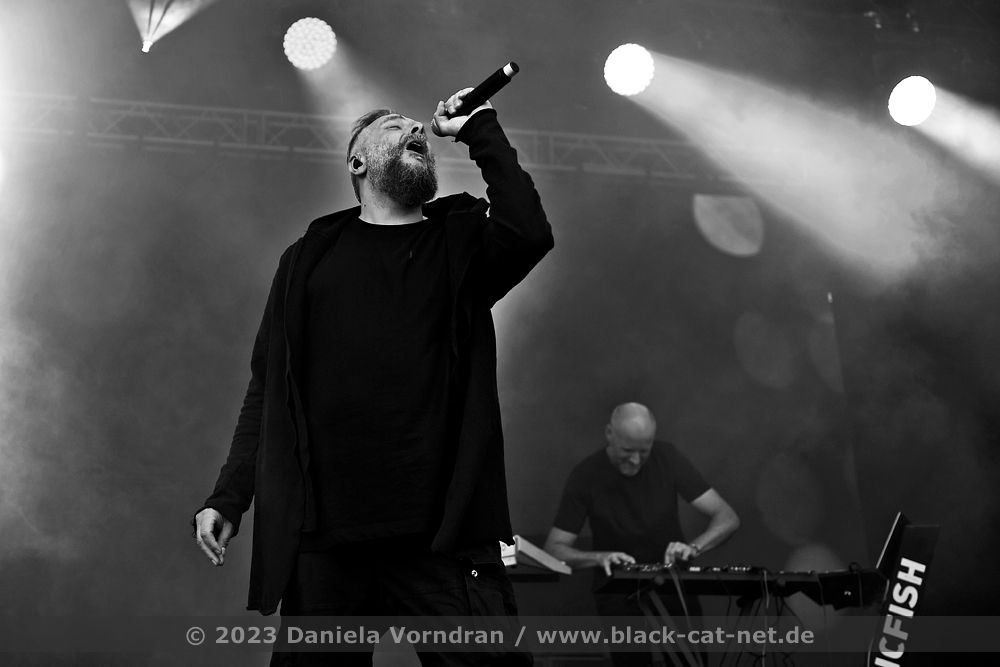
RoD: But you do plan to release those tracks later on.
Sascha: Yeah, we need to see in what context they fit, and then they’ll come out too.
RoD: We briefly talked about it earlier. The album is set to release on 15th December. The following day, on 16th December, there’s another “Heimspiel” at the Kulttempel in Oberhausen. This has almost become a lovely tradition by now.
Sascha: Yeah, we’ve been doing that since 2013 or 2014. I think we started doing the first “Heimspiel” in 2013. This happened simply because Peter [Peter Jurjahn] from Kulttempel asked us, “Let’s do something together”. So, we invited another band, back then it was [:SITD:]. Tom from [:SITD:] is from Gelsenkirchen, just like me. We’re both “Schalker”. And somehow, out of that came the silly idea to call it “Heimspiel” because there were two “Schalker” on stage. Honestly, I’m not really into football otherwise. But I’m a born “Schalker”, can’t help it. That’s why we named it “Heimspiel”. It kind of organically evolved into a concept. And now, here it is, this is already the sixth incarnation. We always invite one or two bands that we currently like and are excited about.
RoD: That means you also decide yourselves whom you want to have as support and sort of wish for them?
Sascha: Yeah, definitely. I always have a wish list. Usually, a “Heimspiel” happens every two years, not every single year. This year, because we have an album, we’re doing it on a shorter interval. We always have a list. Well, I always have a list. Henning isn’t really embedded in the scene, so he doesn’t exactly know what’s going on in the scene. He mostly works in a different genre. He always says I’m his personal curator when it comes to music. I always make Spotify playlists for him and send them over. He has to listen to them. I make lists by going through what’s new in the scene, what’s trending, and what interests me. For instance, RUE OBERKAMPF intrigued me because they create that EBM sound with French vocals. I dig that. It’s like Cold-Wave à la MINUIT MACHINE, very cool stuff. It contrasts well with our repertoire but also fits nicely into the evening. And LAKESIDE X is more Synth-Pop-oriented, a bit softer. I think it adds a nice touch to the evening.
RoD: For me, your shows are always, I’d almost say, like an emotional refreshment. You always exude this inner calmness, this kind of positive aura. When you step on stage, there’s always this feeling, “everything will be okay, everything is alright”. [Sascha laughs]
Sascha: But that’s a mistake. Internally, if you could take a look inside me - holy cow!!
RoD: Are you very nervous? Do you have stage fright?
Sascha: Not stage fright, but excitement. It’s all that adrenaline you have as a performer during a live show, when it suddenly gets released, that’s why I have an iPad up front with me. When my head’s full of adrenaline, I don’t remember my own lyrics. One part of the brain goes, “Wow, look at all those people out there”. The other part says, “Hey, you need to remember your lyrics”. Then the other part goes, “Oh my God! Look at that. Oh man, you need to watch for your cue. The cue’s coming in two seconds.” That’s how it goes in my head. So, it’s an insane ride accordingly. A live show is like a ride for me, really. It’s super thrilling. Especially, you’ll notice, it takes me about two or three songs, and then I’m in it. Once I’ve got that drive, I just don’t stop. So, a “Heimspiel” might easily go on for two hours, two and a half or so. Suddenly, it’s like, “yeah, come on. We have a few more songs. Let’s play those. Third encore. Oh well, who cares.” And it really depends on the vibe of the evening. Actually, if I were calm on stage, oh no. [Sascha laughs] If I give that impression, then I’m doing really well. I need to remember that.
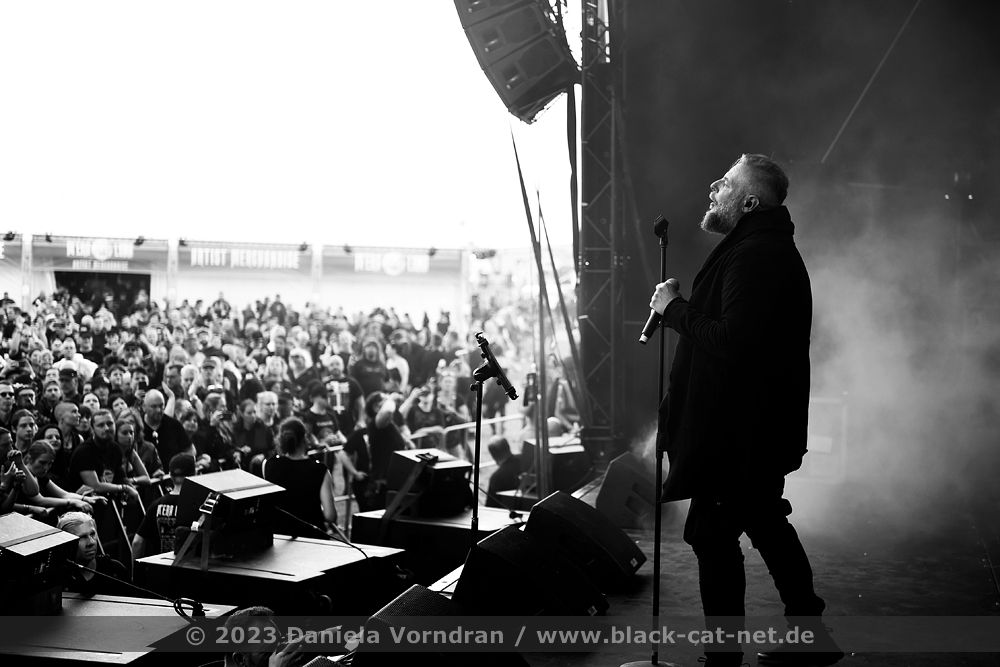
RoD: Does that mean you put together the setlist relatively spontaneously? Or do you prepare it somewhat in advance? And how do you prepare for a show in general?
Sascha: We’re the band that never rehearses.
RoD: I think there are several, at least several, who claim that about themselves.
Sascha: We have a setlist ready, covering all eventualities. Because, you have to. Henning also has to program his computers accordingly. If I decide I want to play ‘They’re Coming To Take Me Away’ and if that’s not in the setlist or if Henning hasn’t pre-programmed it into his sequencers, then we’ll be in a bit of a pickle. So, there needs to be a certain basic order. But for example, we have a main set that we stick to. And afterward, we have these encore sets. I actually approach those encore sets based on my physical condition. If I’m so out of breath that I can hardly get a sound out, then I won’t do ‘They’re Coming To Take Me Away’ because that song wrecks you. It’s such a staccato singing style. But for instance, I could play a different song instead. And we’ve set up this basic plan, but for the encores, we’re happy to swap a song out and bring in the next one. That’s easier. However, with the main set, we usually stick to it quite closely because we want to take the audience on a bit of a ride. Fast songs, then cool it down a bit, then amp the crowd up again, and then cool it down once more. So that it becomes a great experience. Like a little rollercoaster ride.
RoD: Are there songs that you consciously choose not to play because you think or have noticed that they don’t work well live, even though you like playing them? And conversely, are there songs that you actually don’t feel like playing anymore, but you know everyone wants to hear them?
Sascha: Actually, there was a time when I couldn’t stand ‘Velocity’. But now, I’m totally cool with it. That was a few years ago. Like, five or six years back, it was like, “ugh, now I have to do ‘Velocity’ too”. But actually, we re-released it last year because it turned 20. And you know what? I’m cool with it again. I hardly have any songs now that I don’t feel like playing. ‘They’re Coming to Take Me Away’ is actually one that sometimes falls through the cracks because it’s just so difficult to sing. I have to conserve my energy a bit on stage, otherwise, I’ll be sick for days afterward. So, I have to make sure that I manage the show’s energy in a way that’s sustainable for me. Consequently, that song often gets left out of the set because it’s just exhausting. But sometimes, when I’m feeling really good and I’m like, “I’ve got more in me”, Henning just laughs.
We have these two or three hand and gesture signals on stage to communicate. When I give him a signal, you can see him grinning. “Alright, he’s up for it, he wants to go for it again.” And then, we play ‘They’re Coming to Take Me Away’. But honestly, there isn’t a song now that I really don’t want to play. And one that I still love playing, it’s always ‘Civilized’. In that song, I switch into a different kind of singing. The verse is sung in a normal, pretty relaxed voice. When the chorus hits, I switch to this smoky, kind of rocky, almost screaming voice. And that switch, artistically, it’s always so exciting for me. Sometimes, I might even miss a note. [Sascha laughs] That’s why I find it so enjoyable. Because I can really scream my heart out in that song. It clears my head when I’m on stage. It’s also one of my favourite songs. ‘Civilized’ will always be in the set and always upfront because it really fires me up. After singing that song, I’ve truly recharged, got a ton of energy.
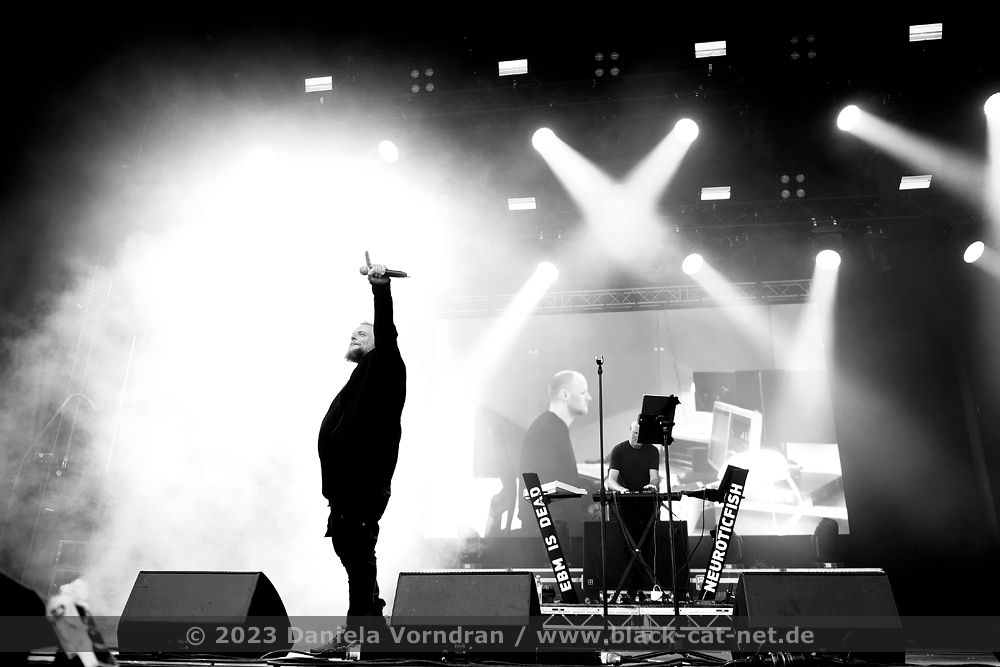
RoD: Do you listen to a lot of music in your personal time? I always have the impression that there are two types of musicians. Some hardly listen to any music at all. And then there are musicians who listen to a lot of different music and enjoy being inspired by it. What about you?
Sascha: Actually, I’d love to listen to a lot more music than I currently have time for. But what I’ve actually stopped doing is listening to scene-relevant music. I do that relatively little. I’m also not often at clubs - not because I don’t like it, but because my musical taste has shifted a bit. I still listen to my classics. I still listen to my SKINNY PUPPY. I still listen to my FRONTLINE ASSEMBLY. That’s all the stuff I love. And I still listen to my DEPECHE MODE and everything. I continue to love that. Something’s happening in the scene right now. There are new acts emerging that are really enjoyable. I do catch wind of those. And when I do, I go, “oh, I didn’t expect that, I like it”. That’s pretty interesting. But they need to have reached a certain threshold for me to notice them. Because there’s a lot of music in the scene that’s relatively uniform. Sometimes in the club (if I happen to be there, which is rare), I’m standing there not knowing what’s playing. I’m really wondering, “is the song over already, or is this a new one?” I don’t mean that in a derogatory way. I mean, there’s just this genre-wise uniformity that doesn’t work for me. That’s why I lose a bit of interest in it.
Right now, I’m really into stuff coming from the US, like WHORTICULTURE. I enjoy WHORTICULTURE’s music a lot because it’s very fresh. I also listen to IAMX, as it’s a melting pot of various indie styles. And BRIGHTER THAN A THOUSAND SUNS – an amazing band that’s more 80s than the 80s ever were. Fantastic, I love listening to them. But these are things that randomly pop up on my timeline. I click on them and think, “wow, what’s this?”. However, actively seeking out scene-specific music, I do less of that. I listen to a lot of THE NATIONAL, I really enjoy that. Such things. A lot of Mainstream, but more Indie-Rock stuff. Anything that has a certain mood, something a bit profound, a bit melancholic. And I make playlists accordingly. I create a lot of playlists with stuff like THE NATIONAL, but then a Techno song comes up next, or things like that. I mix them up to keep a bit of variety in my head. So, yeah, I listen to music. When I used to commute to work, I actually listened to a lot more music, mostly in the car. Now that I work from home and don’t commute, it’s a bit less, but I still listen to plenty of music. Henning doesn’t listen to any music, he said. He relies on my Spotify playlists to roughly keep up with what’s going on.
RoD: I read somewhere - or was it in an interview I saw on YouTube - that you’re a huge Doctor Who fan. I think you’ve received gifts from fans related to that. Do you still get Doctor Who stuff as gifts, and do you still get excited about it, or have you reached a point where you don’t know where to put it anymore?
Sascha: I actually get super excited about that kind of thing. When fans like the same stuff I do. I’m a Star Trek fan, specifically a Next Generation Trekkie, and I’m a Whovian. But a New Whovian.
RoD: Yes, me too. I can’t really get into the old episodes. But the new ones...
Sascha: ...are awesome. My Doctor is the tenth. David Tennant is my Doctor.
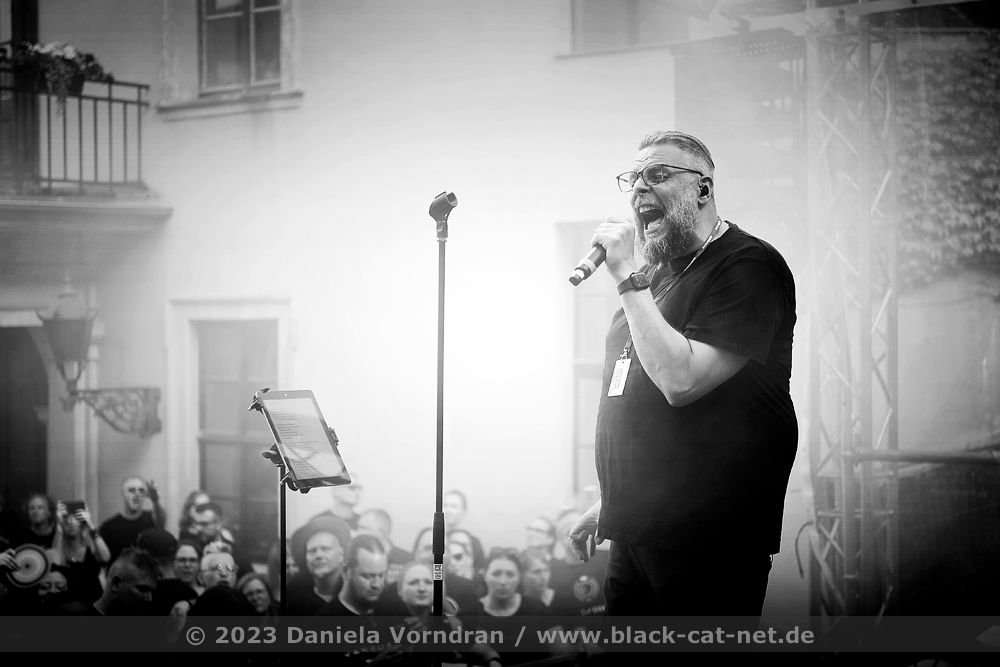
RoD: Tennant was my favourite for a long time. However, Capaldi caught up with him in his second season and is now slightly ahead.
Sascha: Capaldi comes right after. So, I find Capaldi’s grumpiness really great. It’s funny when people come to an autograph session and bring me an inflatable Tardis - yeah, awesome! Or they show me their Sonic Screwdriver - do you have that model too? Yeah, I have that model too. I think that’s totally cool. It’s a level of nerdiness that I (being a nerd myself) really appreciate. And over the weekend, there was a special with the fourteenth Doctor. The tenth is now the fourteenth.
RoD: Have you found time to watch it yet?
Sascha: Yeah, of course! So, my wife and I actually set that up on Disney. We have this lamp that creates a nebula projection on our living room ceiling. It can project stars with different filters. So, we turned our living room into this blue tone. We have a TV on wheels.We put it in the middle, sat on the couch, and truly enjoyed watching that Doctor Who hour. I’m looking forward to what’s next, when the second part of the special comes out. Ah, I love it.
RoD: Ah, I love it too. Actually, I didn’t have any time, and I wasn’t even home on Saturday. And on Sunday, I was supposed to be busy, but when I got home, I still had to watch it. It was a must.
Sascha: Yeah, I totally get it.
RoD: So, I think I’ve reached the end of my questions. One more thing: I dreamt about you…
Sascha: Oh. [Sascha laughs]
RoD: Well, I actually went through some earlier interviews and articles beforehand and refreshed my memory about you guys. And somehow, I dreamt about you. Specifically, I dreamt that the plaid shirt is back. That you’re back on stage wearing a plaid shirt. But I guess those times are over, right?
Sascha: They’re over for now. That plaid shirt caused so much controversy. I find it funny because it’s just a piece of clothing. How do you stand out in the scene or differentiate yourself as a frontman when the audience is usually dressed fancier than you? Everything’s in the same colour scheme. It’s all black. We’re the black scene. People on stage mostly look like the people off stage, sometimes even better. I wanted to create a contrast. I wanted to say, “okay, but look at this. I’m wearing a plaid shirt now. You can’t do anything about it.” And that actually sparked a bit of, let’s not say “negative”, but it caused a stir among some people on social media. I found that funny. Then, the red plaid shirt turned into a grey one. And then it eventually disappeared. But for the “Heimspiel”, I’ll try out a new outfit. Stay tuned.
RoD: Oh, I’m excited! Well, that’s it. Thank you very much again for your time, and I’m really looking forward to the “Heimspiel”. We’ll definitely report on it.
Sascha: Absolutely, and I’m really excited for the “Heimspiel” and to see all of you there. So many people have said they’re coming, and it’s going to be a blast. Plus, there are two bands playing that I’m eager to watch from the side because I genuinely like them. Thank you very much for this lovely interview.
Website: http://neuroticfish.com / https://www.facebook.com/OfficialNeuroticfish
Band Picture by Judith Klein, live Pictures by Daniela Vorndran




